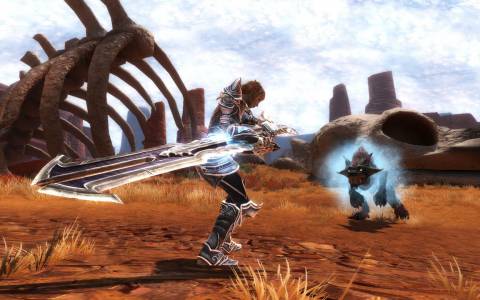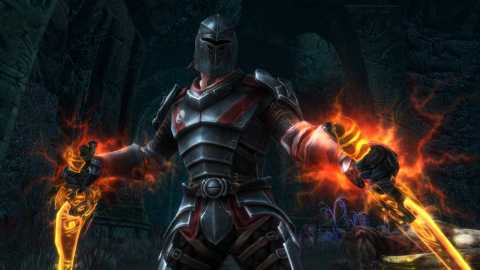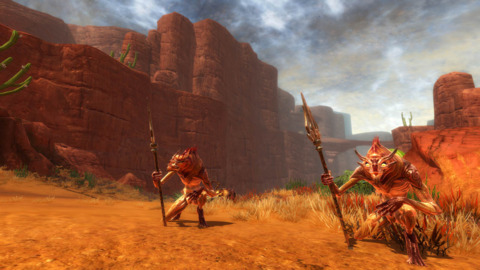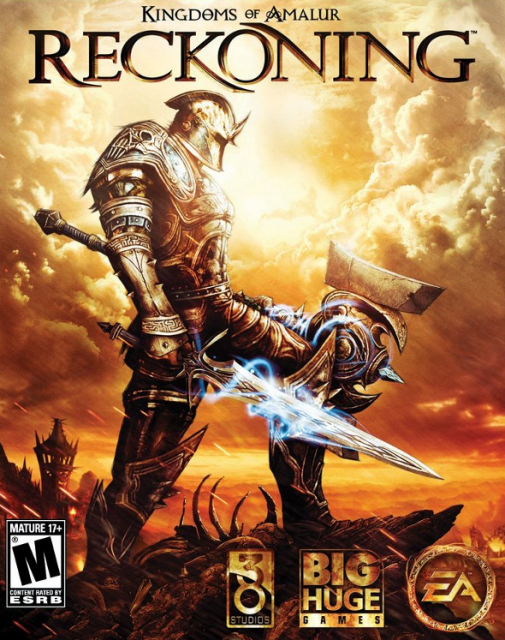Kingdoms of Middling Side Quests
The minds behind Kingdoms of Amalur: Reckoning are certainly cultured in the world of fantasy RPGs. Ken Rolston brings his pedigree (and some Bethesda alumni with it) having worked on both The Elder Scrolls: Morrowind and its successor, Oblivion; while accomplished fantasy writer R.A. Salvatore breathes life into the world of Amalur, creating a 10,000 year history for the developers at Big Huge Games to pull from. When you factor in the fantastic art design from Todd McFarlane and the enthralling backing from retired baseball star Curt Schilling (yes, really), it’s easy to proclaim you have a veritable dream team of talent for the genre, and the exciting precedence for a new IP to really blossom.

Reckoning starts off on the right path, even if its beginnings are fairly derivative. Upon creating your character using a fairly limited creation system, you wake up amongst a pile of festering, rotting corpses. You were previously dead yourself but have since awoken: a successful lab experiment and the latest in a long line of video game protagonists suffering from a contrived bout of amnesia. Before long you discover you’re quite the unique prospect in the land of Amalur: one without a pre-determined destiny. This is a world governed by fate, its residents able to visit fortune tellers to see how they’ll end up; left to live their lives on a decided path. Only the Tuatha – an evil race of elves – are able to be resurrected once they pass, so the fact you’re the first non-immortal to do so has shifted the balance of the kingdom and left you without the burden of a preordained life – a blank slate ready to be crafted.
Not only is this a superb premise for the narrative that unfolds but, as you can imagine, it also factors into the gameplay and character building. There are three archetypal RPG classes to choose from: Might (warrior), Finesse (rogue) and Sorcery (mage). Each presents itself with different skill trees but you’re not asked to pick one, singular class. Instead, you’ll dump points into different active and passive abilities on each tree, allowing you to mix and match classes. This allows a fantastic amount of freedom and variation as you’re able to craft a skill set of your choosing, perhaps mixing together Finesse and Sorcery to create a stealthy magic-user, or combining all three sets together to reap the rewards of a well-rounded jack-of-all-trades.
Depending on what path you choose you’re granted with multiple destinies that provide you additional stat bonuses. So if you choose Might you may find increased damage multipliers or supplementary health, while someone combining both Might and Sorcery may receive a bonus to elemental damage and improved mana regeneration. It’s a meritorious system that encourages experimentation, the lore endorsing re-specialisation if you want to try another path.
Of course, that will come down to how you want to play Reckoning. Each class brings with it its own set of weapons, from longswords and giant hammers, through to daggers, longbows and staffs. Their over-the-top designs provide a sense of personality, while more unconventional weaponry like the chakrams and faeblades offer a welcome change of pace from the more regular fantasy tropes.

Whichever set you choose you’ll find a simple one-button setup. There are no elaborate combinations for increasingly complicated attacks (whether you’re using a mouse and keyboard or a gamepad), instead you’ll time and change the pace of button presses to execute different combos. It’s easy to pick up and play and there’s a nice fluidity to the way it handles, allowing you to go from using a staff, to slicing guys up with a pair of daggers before switching to a variation of magical, elemental attacks. It hits hard and is very satisfying; Reckoning’s bevy of diverse enemy types requiring a smattering of dodges, blocks and counters to stay out of trouble. Crowd control is often the name of the game, facing off against big and small foes; magic-users and straight up brawlers. It keeps you on your toes, the game’s loot-driven nature repeatedly throws up new weapons to starve off any sense of tedium.
It’s the side quests that invoke the greatest sense of apathy - and even implicate the combat in some major ways. Along your travels you’ll encounter an overwhelming amount of quest givers; your map quickly filling up with blinking lights like it’s Christmas at Rockefeller Centre. This cluster of side quests and tasks offer little but middling content despite their increasingly high numbers. Collect x amount of items or kill y amount of enemies; it’s unimaginative and provides a stark reminder ofReckoning’s MMO beginnings (and its future), drudging up mundane and repetitive quests to pad out the content. None of it is compulsory, of course, but when a game is stacked with 200 or so quests, it would be nice if some of them were the least bit enjoyable.
If you do decide to partake in any number of these quests then there’s also a real threat your character will over-level, negating any sort of difficulty the combat once had. You’ll often find yourself fighting enemies with grey names, indicating they are no match for your combat prowess; it’s a wonder they don’t flee in horror at the sight of you. This seems like a major oversight, particularly for a game as action-oriented as Reckoning is. The combat may be fantastic but it’s still relatively simple. If you play too many side quests the formula becomes rote, and that simplicity just can’t carry a hundred hour game. Reckoning may be a loot driven game, but no reward is worth the banality the side quests offer.
Fortunately, the main quest line and faction quests are eminently better. Your character may be an emotionless entity, but the rest of the writing and voice acting elevates the narrative’s quality. There are branching storylines, interesting and set-piece driven combat scenarios, enjoyable boss fights and plenty of exotic locales.

For the world of Amalur is a large place with distinct areas for you to explore. It doesn’t encourage exploration as much as something like Skyrim, instead opting to funnel you down corridors between much larger areas; but it’s a vast game world with plenty to see, the art style shining through despite its poor draw distance and some low-res textures. The desert area provokes an oddly befitting Wild West vibe with its orange hues and rocky mountains, while the wide open plains of Erathell are transcendent with their use of space and colour. Reckoning might not have the graphical fidelity of some of its counterparts, but its bright colour palette, excellent art design and smooth level of performance is certainly an aspect to be lauded. The orchestral score helps too: it’s often riveting, inciting a sense of enchantment and wonder, beckoning on your adventure. It’s really phenomenal throughout.
The same cannot be said for all of Reckoning’s many parts, however, but there’s an enjoyable game here with some interesting ideas - providing you stick closely to the main quest line and faction quests. The drabness and profusion of the side activities is too big a dampener to ignore, especially once it significantly impacts the gratification of its combat. If you treat Kingdoms of Amalur: Reckoning as a shorter, story-driven experience, you’ll have a much better time of it than the completionist who chases every single side quest.
